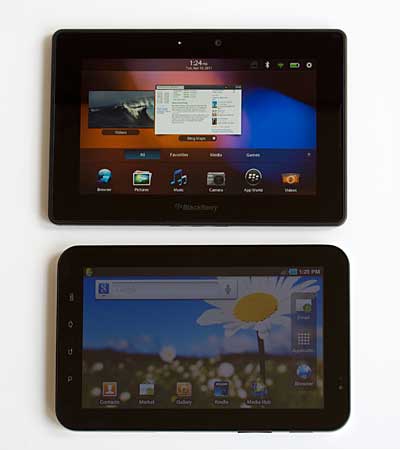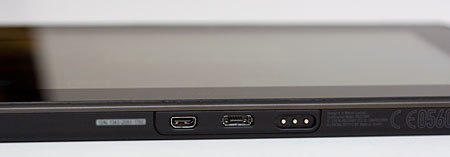The BlackBerry PlayBook 7" tablet is here, and a spate of pre-release reviews were less than stellar. RIM may be late to the game, but they've got a fresh new OS powered by QNX and a divine user interface that we'd applaud even more vocally were it not such a blatant rip off of Palm/HP webOS. The PlayBook is available in WiFi-only models (3G/4G versions are coming in May or June, with Sprint being first), and the 16 gig WiFi version we have for review sells for $499. A 32 gig model will set you back $599 and a 64 gig model is $699, similar to iPad 2 pricing.

The tablet has a quality feel to it with a soft touch finish and understated design that reminds us of the Motorola Xoom (that's not a bad thing). It doesn't have the plastic look and feel of the 7" Samsung Galaxy Tab, and at 14.9 ounces it has some heft. The PlayBook runs on a 1GHz dual core CPU that's quickly become the standard for tablets in various operating systems, and it has a healthy gig of RAM. It has a rear 5 megapixel camera and a 3 megapixel front camera, though there's not much you can do with the front camera beyond taking photos of yourself. Both cameras can shoot sharp and colorful 1080p video at 30fps and they're the best we've seen on tablets.
The PlayBook makes a very good first impression. The hardware has that quality look, and the 1024 x 600 capacitive display is very bright, sharp and colorful. It's large enough to read a web page without much zooming, yet small enough to fit in a large jacket pocket or purse. The home screen and user interface are easy to understand and delightful to use. It plays video like a champ, even 1080p.

The BlackBerry Playbook and 7" Samsung Galaxy Tab.
The tablet has a soft touch finish that feels good in hand and squared off sides that ensure a positive grip. At 0.4" it's thin enough to be fashionable, and it's solidly built. Much ado has been made about the power button because pre-release review units had a very inset power button that was difficult to press. RIM said shipping units would have a slightly different design and indeed, our unit's power button is tiny but not sunk so deep that you can't press it with the flesh of a finger. Note that you can wake up the PlayBook at any time by swiping bottom to top across the display. Be sure to start from the black bezel because the bezel is touch sensitive as well and reacts to gestures.

Deals and Shopping:
Advertisement
The power button and volume controls are up top. I found that I accidentally activated the screen shot function (press volume up and down simultaneously) when picking up the tablet sometimes. The micro USB port for charging and syncing, micro HDMI port and dock contacts are on the bottom edge. The 3.5mm stereo headphone jack is up top as are the mics, and stereo speakers of surprisingly good quality and volume flank the display. It's ironic that Apple's iPad and iPhone products still lack stereo speakers despite their iTunes heritage. Score one for RIM.
Early reviews of the pre-release product noted copious bugs and the absence of BlackBerry Bridge that allows the PlayBook to grab PIM data and email from a BlackBerry smartphone. Happily, the release version we have (after downloading a 287 meg update out of the box, then a second large update a few days later) has been fairly stable with no out of memory errors even when running several programs simultaneously. Adobe Flash 10.1 playback is very impressive and we didn't feel like we were suffering through yet another lame mobile implementation of full Flash. The webkit web browser does have a tendency to occasionally silently crash and disappear taking all its tabs with it however.
BlackBerry Bridge is available for Sprint, T-Mobile and Verizon OS 5 and 6 BlackBerry smartphones, but not AT&T. AT&T is still testing the app, according to their PR team... that sounds a little fishy, AT&T. Without Bridge you won't have contacts, calendar or email unless you can access them via the web browser. With Bridge you can use your BlackBerry phone as a wireless modem for the tablet, though your carrier may require that you pay for a tethering plan to do so.
The webkit web browser is perhaps the best we've seen on a mobile OS device. Though Android and the latest iOS browser on the iPad 2 are a tad quicker on Javascript rendering, the PlayBook not only supports Flash but it renders with the best fidelity. Complex web pages, blog back ends and other challenges were no problem for the PlayBook. Pinch zooming is smooth and responsive and the accelerometer responds with decent speed for page orientation changes. The browser can even handle playing Amazon video on demand and Hulu (with a little work-around since Hulu blocks all mobile devices).

The tablet has a quality feel to it with a soft touch finish and understated design that reminds us of the Motorola Xoom (that's not a bad thing). It doesn't have the plastic look and feel of the 7" Samsung Galaxy Tab, and at 14.9 ounces it has some heft. The PlayBook runs on a 1GHz dual core CPU that's quickly become the standard for tablets in various operating systems, and it has a healthy gig of RAM. It has a rear 5 megapixel camera and a 3 megapixel front camera, though there's not much you can do with the front camera beyond taking photos of yourself. Both cameras can shoot sharp and colorful 1080p video at 30fps and they're the best we've seen on tablets.
The PlayBook makes a very good first impression. The hardware has that quality look, and the 1024 x 600 capacitive display is very bright, sharp and colorful. It's large enough to read a web page without much zooming, yet small enough to fit in a large jacket pocket or purse. The home screen and user interface are easy to understand and delightful to use. It plays video like a champ, even 1080p.

The BlackBerry Playbook and 7" Samsung Galaxy Tab.
The tablet has a soft touch finish that feels good in hand and squared off sides that ensure a positive grip. At 0.4" it's thin enough to be fashionable, and it's solidly built. Much ado has been made about the power button because pre-release review units had a very inset power button that was difficult to press. RIM said shipping units would have a slightly different design and indeed, our unit's power button is tiny but not sunk so deep that you can't press it with the flesh of a finger. Note that you can wake up the PlayBook at any time by swiping bottom to top across the display. Be sure to start from the black bezel because the bezel is touch sensitive as well and reacts to gestures.

Deals and Shopping:
Advertisement
The power button and volume controls are up top. I found that I accidentally activated the screen shot function (press volume up and down simultaneously) when picking up the tablet sometimes. The micro USB port for charging and syncing, micro HDMI port and dock contacts are on the bottom edge. The 3.5mm stereo headphone jack is up top as are the mics, and stereo speakers of surprisingly good quality and volume flank the display. It's ironic that Apple's iPad and iPhone products still lack stereo speakers despite their iTunes heritage. Score one for RIM.
Early reviews of the pre-release product noted copious bugs and the absence of BlackBerry Bridge that allows the PlayBook to grab PIM data and email from a BlackBerry smartphone. Happily, the release version we have (after downloading a 287 meg update out of the box, then a second large update a few days later) has been fairly stable with no out of memory errors even when running several programs simultaneously. Adobe Flash 10.1 playback is very impressive and we didn't feel like we were suffering through yet another lame mobile implementation of full Flash. The webkit web browser does have a tendency to occasionally silently crash and disappear taking all its tabs with it however.
BlackBerry Bridge is available for Sprint, T-Mobile and Verizon OS 5 and 6 BlackBerry smartphones, but not AT&T. AT&T is still testing the app, according to their PR team... that sounds a little fishy, AT&T. Without Bridge you won't have contacts, calendar or email unless you can access them via the web browser. With Bridge you can use your BlackBerry phone as a wireless modem for the tablet, though your carrier may require that you pay for a tethering plan to do so.
The webkit web browser is perhaps the best we've seen on a mobile OS device. Though Android and the latest iOS browser on the iPad 2 are a tad quicker on Javascript rendering, the PlayBook not only supports Flash but it renders with the best fidelity. Complex web pages, blog back ends and other challenges were no problem for the PlayBook. Pinch zooming is smooth and responsive and the accelerometer responds with decent speed for page orientation changes. The browser can even handle playing Amazon video on demand and Hulu (with a little work-around since Hulu blocks all mobile devices).
0 Comment "BlackBerry PlayBook"
Post a Comment